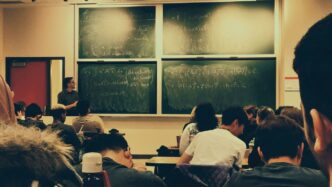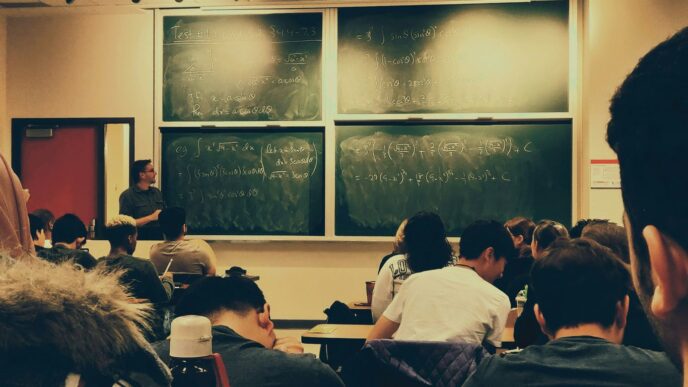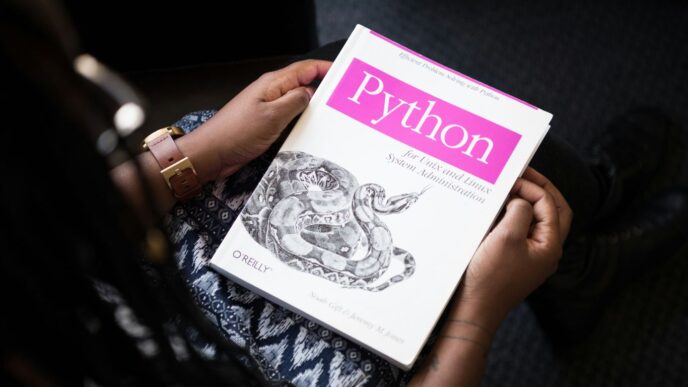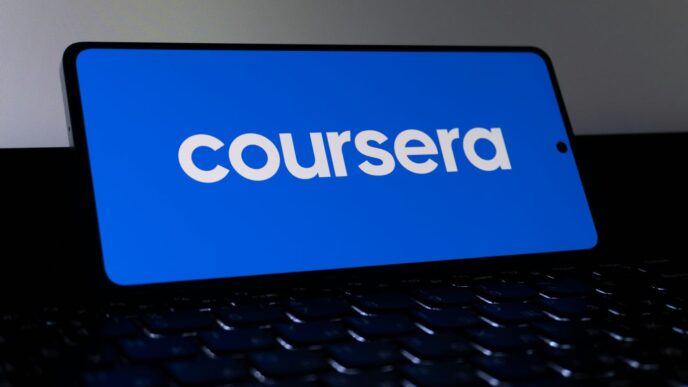Understanding Gatech PACE Course Structure
Alright, let’s break down how Georgia Tech’s PACE course is put together. It’s not just a bunch of lectures; there’s a definite system to it, and knowing that system can make a big difference in how you do.
Core Components of Gatech PACE
The course generally revolves around a few key areas. You’ve got your lectures, which introduce the concepts. Then there are the assignments, where you actually try to use those concepts. And finally, there’s usually a bigger project, often at the end, that lets you explore something more deeply. The balance between these parts is pretty important for your overall grade.
Assignment Breakdown and Weighting
Assignments are where a lot of the learning happens. They’re designed to test your grasp of the material, and they often involve coding. The exact weighting can shift a bit from semester to semester, but typically, assignments make up a significant chunk of your final grade. You might see something like this:
| Component | Approximate Weighting |
|---|---|
| Assignments | 60-70% |
| Final Project | 20-30% |
| Final Exam | 10-20% |
Keep in mind, these are just general figures. Always check the syllabus for the most accurate breakdown for your specific semester.
Project Options and Considerations
When it comes to the final project, you usually have some freedom. This is your chance to pick a topic that interests you within the course’s scope. Some common themes might include:
- Image Processing: Working with images, maybe for recognition or enhancement.
- Machine Learning Applications: Building models to predict or classify data.
- Robotics or Control Systems: Implementing algorithms for physical systems.
Choosing a project that aligns with your interests and skills is a good idea. It’s also wise to consider the scope – you don’t want something so ambitious that you can’t finish it, but it should be challenging enough to be rewarding.
Navigating Gatech PACE Assignments
Alright, let’s talk about the assignments in Gatech PACE. These are where you really get to apply what you’re learning, and honestly, they can be a bit of a puzzle at first. The course usually has about eight homework sets, with the early ones being a bit lighter on the grading scale. For instance, HW1 might only count for 4% of your grade, while the others are worth around 11% each. Some students find HW2 and HW7 particularly tricky, so it’s a good idea to start those early.
The real challenge often isn’t the coding itself, but figuring out the right parameters. You’ll spend a good chunk of time tweaking these to get your code to produce the results the professor is looking for, especially for the reports which are mostly image-based. It’s less about complex algorithms and more about fine-tuning.
Here’s a general breakdown of how assignments might be weighted:
- Early Homeworks (e.g., HW1-2): Lower percentage, often introductory. (Approx. 4-10%)
- Mid-Semester Homeworks (e.g., HW3-6): Standard percentage, increasing in complexity. (Approx. 10-12% each)
- Late Homeworks (e.g., HW7-8): Higher percentage, often the most involved. (Approx. 11-15% each)
- Bonus/Extra Credit: Opportunities to boost your score.
When you get stuck, and you probably will, Piazza and the class Slack channel are your best friends. Seriously, a lot of the time, someone has already asked your question, or a TA has provided a helpful hint. Don’t forget to check out the TA’s office hour videos on YouTube too; they often break down the assignments in detail, which can save you hours of frustration. It’s all about using the resources available to piece things together.
Gatech PACE: Lecture and Learning Experience
When you’re diving into Georgia Tech’s PACE program, the lectures are your primary source of information. They’re generally pretty good, offering a solid foundation for the material. Some students find the lectures to be the best they’ve encountered in their program, which is saying something. However, it’s not always a perfect fit for everyone. The instructors, while experts, sometimes present information from a high-level view. This means you might miss those
Mastering Gatech PACE Projects
Choosing the Right Final Project
Picking your final project in PACE is a big deal. It’s your chance to really show what you’ve learned, and honestly, it can take up a good chunk of your time. There are usually a few different topics you can pick from, and each one has its own set of instructions. Some students find it helpful to look at what previous students have done, but remember, the goal is to explore new methods or apply concepts in your own way. Think about what aspects of the course you found most interesting. Did a particular algorithm click with you? Were you fascinated by a certain application? Your project should ideally align with your interests to keep you motivated through the potentially long hours.
Strategies for Project Success
Success in the PACE final project often comes down to a few key things. First, break down the project into smaller, manageable tasks. Don’t try to do it all at once. Start with understanding the problem statement thoroughly, then move to research, implementation, and testing. Keep track of your progress. Using tools like a simple to-do list or a project management app can make a big difference. Also, don’t underestimate the power of peer discussion. Many students find that talking through problems with classmates on platforms like Slack or Piazza can lead to breakthroughs. When you hit a wall, and you probably will, try explaining the problem to someone else – it often helps clarify your own thinking.
Here’s a general approach:
- Understand the Requirements: Read all project guidelines carefully. Make sure you know what’s expected.
- Plan Your Approach: Outline the steps you’ll take. What libraries will you use? What algorithms will you implement?
- Iterate and Test: Build your project piece by piece. Test each component as you go to catch errors early.
- Seek Feedback: If possible, get feedback from TAs or classmates on your approach or early results.
Time Management for Major Projects
Let’s be real, the final project can be demanding. Some students report spending significant time on it, sometimes needing to pull all-nighters. The key is to start early. Don’t wait until the last few weeks. Create a realistic timeline for yourself, allocating specific blocks of time for project work each week. If you fall behind, it’s incredibly hard to catch up, especially if you’re also juggling other assignments or exams. Treat your project work like any other important commitment. If you’re finding it tough to balance, consider discussing your workload with your academic advisor or a trusted mentor. Remember, it’s better to manage your time proactively than to scramble at the last minute.
Gatech PACE: Exam Preparation and Performance
So, you’ve made it through the assignments and projects, but now it’s time to face the final exam. Don’t let the ‘open book’ label fool you; this exam really tests your grasp of the material. Many students find it challenging because you need a solid understanding to even know where to look for answers quickly. Falling behind on lectures makes this even tougher, so keeping up is key.
Exam Format and Difficulty
The final exam is typically open book and open note, which sounds like a relief, right? However, the questions often require you to synthesize information and apply concepts, not just find specific sentences. Expect a mix of question types that probe your understanding of the core principles covered throughout the course. Some students report the difficulty as high, especially if they haven’t consistently reviewed the material. It’s not uncommon for students to do well on projects and assignments but struggle with the exam if they don’t dedicate specific time to studying for it.
Effective Study Strategies
To really nail the exam, a structured approach to studying is a must. Here are a few things that seem to work:
- Review the Study Guide: Many students find the provided study guide incredibly helpful. Discussing it with classmates can also clarify points you might have missed.
- Revisit Lectures and Notes: Even if you attended lectures, going back through them, especially for topics you found tricky, is important. Focus on the concepts and how they are applied.
- Practice Problems: If practice exams or problem sets are available, work through them. This helps you get a feel for the types of questions asked and reinforces your knowledge.
- Start Early: Don’t wait until the last week. Begin reviewing material at least a week or two in advance to avoid feeling overwhelmed.
The Importance of Comprehensive Review
Given the breadth of topics covered in PACE, a comprehensive review is non-negotiable. It’s easy to get bogged down in the details of specific assignments or projects, but the exam often looks at the bigger picture. Make sure you’re not just memorizing code snippets but understanding the underlying computer vision concepts. Many students who struggled on the exam admitted they didn’t allocate enough time for review, often underestimating how much material there was. A good strategy is to create a summary sheet or flashcards for key concepts and formulas. This way, you have a quick reference during your final study push.
Student Experiences with Gatech PACE
So, what’s it actually like taking a PACE course at Georgia Tech? Based on what students say, it’s a mixed bag, but mostly leaning towards a solid learning experience, if you’re ready for the work. Many folks find the workload pretty substantial, often hitting around 15-25 hours per week, especially when major projects are due. It’s not a class you can just coast through.
Workload and Time Commitment
The time commitment can really vary. Some weeks might feel manageable, maybe around 12 hours, while others can jump to 20 or even more. It seems like a lot of students recommend watching lectures early and staying on schedule. Falling behind is a common pitfall, and catching up can be tough. Many students found that dedicating weekends to projects was a common strategy, with some projects taking up entire weekends.
Here’s a rough idea of what people reported:
| Workload Category | Average Hours/Week |
|---|---|
| Typical Weeks | 12-15 |
| Project Weeks | 20-25+ |
Perceived Difficulty Levels
Difficulty often comes down to implementation details rather than the core concepts themselves. The lectures might lay out the theory, but translating that into working code, especially with parameter tuning, is where the real challenge lies for many. Some students mentioned that having prior experience with related subjects, like computer vision or AI, gave them a leg up. The math involved can also be dense, so a comfort with linear algebra helps.
Key challenges often mentioned:
- Parameter Tuning: This is a recurring theme. Getting those last few percentage points on assignments often requires significant time spent tweaking parameters, which some find tedious.
- Implementation Details: Making the code work correctly, especially with specific auto-grader requirements, can be tricky.
- Keeping Up: The sheer volume of material means staying current is important to avoid getting overwhelmed.
Community Support and Collaboration
Piazza and Slack channels are frequently cited as lifesavers. Many students found that questions they had were often already answered on Piazza, especially in module-specific threads created by TAs. Active participation in these forums, or even just lurking to see what others are asking, can really help clarify concepts and project requirements. Some students felt the TA coordination could be better, leading to occasional confusion, but generally, the peer support and TA resources were seen as helpful, provided you engage with them.
Overall, while the workload and implementation challenges are real, students who actively engage with the material and the course community tend to find the experience rewarding.
Wrapping It Up
So, after going through all of this, it’s clear that this class is a real challenge, but most students seem to think it’s worth the effort. You’ll probably spend a lot of time on the assignments, and sometimes figuring out what to do can be tough, especially if the professor isn’t super hands-on. Leaning on your classmates and the TAs is a good idea. Just be ready to put in the hours, especially with the projects and the final exam. It might feel like a lot, but most people come out of it feeling like they learned a ton. It’s definitely a course that pushes you, but the payoff seems to be there if you stick with it.














